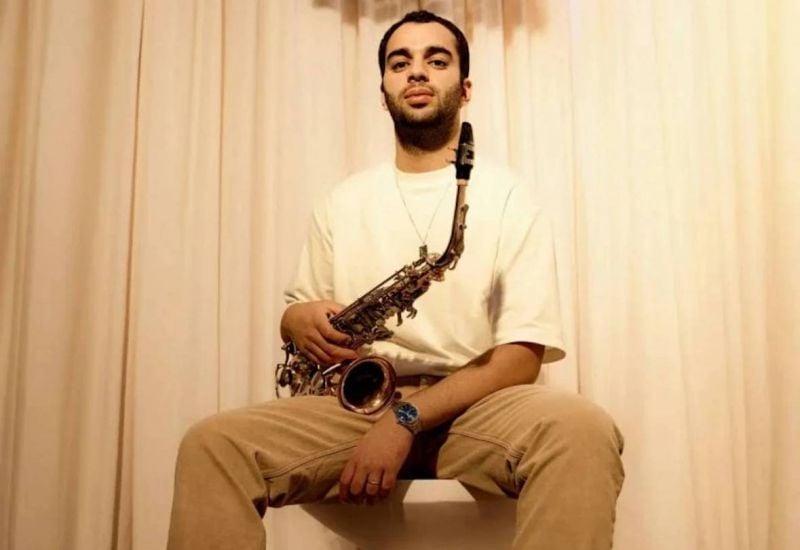
The Egyptian electro-acoustic performer Ash had his Lebanon debut Saturday September 2 in Batroun. (Credit: DR)
The rendezvous was in Batroun, Saturday Sept. 2, at sunset. The occasion was the performance that multi-instrumentalist musician and Franco-Egyptian producer Ashraf Mouawad, widely known as Ash, promised his Lebanese fans.
The 26-year-old artist is an unconditional fan of Lebanon, and eagerly awaited this first performance here, organized by Blubay Batroun and Holoscene creative studios.
Joined by L’Orient-Le Jour in Georgia, where he performed last week, Ash didn’t hide his enthusiasm.
“Honestly, I think I’ve repeated this sentence to my friends to the point of annoying them, but I’m counting the hours until this very special concert. I love Lebanon, and I’ve wanted to perform there for years. I hope this concert in the unique setting in the bay of Batroun will bring joy to the people,” he said ahead of his concert in the Lebanese coastal town.
With 700 million streams on digital platforms, Ash owes his love for Lebanon mainly to a childhood friend and his best friend, both of whom are Lebanese.
From a single visit to Lebanon in 2015, where he spent the holidays in Achrafieh and visited many cities, he mainly remembers an evening in Mar Mikhael.
“My friend and I randomly walked into a bar, and I remember that we stayed there for more than seven hours listening to live bands,” he added. “I find Lebanon unique, not only for its cuisine — I love manakish — but especially for its rich musical culture.”
Orientalism
Ash does not hesitate to express his pain following the explosion at the port in August 2020. “I was with a Lebanese friend in Montreal that day,” he recounted. “His family was in Lebanon. I lived a fearful, stressful and a terrifying moment that I will never forget. It was natural for me to try to do something, in my own way, for Beirut.”
A few days later, still in Canada, Ash held a live online session, in tribute to the wounded city with the aim of raising funds for its reconstruction.
Even though he was apprehensive about electronic remixes of classic songs, he opened his set with “Li Beirut,” an iconic song by Fairuz, featuring vocalist Samia. When he played his saxophone, the music resonated, melancholic, on the rooftops of Montreal, paying homage to Beirut.
Fairuz is another heartfelt story for Ash. He learnt about her at a very young age in Cairo, when she was singing in Egyptian dialect on TV, just like Egypt’s great artists Umm Kalthoum and Abdel Halim Hafez. Today, he said his electric music, primarily characterized by Middle Eastern sounds, is very much influenced by Egyptian music. It also incorporates French influences, as Ash often traveled to Paris with his parents.
“When you open my playlist on my phone, you would expect to find electronic music, but it’s more like Julien Clerc, Fairuz, Abdel Halim and Francis Cabrel,” Ash said.
“Growing up, I obviously listened to a lot of electronic music as well, and I embarked on a DJ career during my adolescence. But I soon felt that I was imitating Western stars and DJs and that I needed to create my own music. So, I composed a track, and without thinking too much, I added an oriental melody that I had in mind, and that’s how my first track, “Lost,” was born,” he said.
After this initial modest success, his interest in Western music and deep house continued. In Montreal, where he settled with his family after school, he pursued his studies in economics and political science.
While he dreamed of making it in the music industry, he didn’t dedicate much time to it. One evening, just for fun, he composed an oriental track titled Mosaic, which he shelved for over six months until a friend advised him to post it on platforms.
The track, which has more than 150 million views today, had turned into an expected success, followed by other tracks that attracted an international audience, such as “Worlds Apart,” “Give a Little,” “Daydream,” “Dans la Peau,” and “About Life.”
These soothing melodies offer the listeners an experience for the senses, accompanied by music videos filmed in picturesque settings of his beloved cities, from Belleville in Paris to the pyramids of Giza in Cairo, and even in Montreal, where he resides “surrounded by many Lebanese.”
Throughout the year, Ash performs numerous concerts in Los Angeles and Georgia, where he shares his own compositions using all the instruments he has mastered: guitar, saxophone, keyboard, drums and synthesizer.
“Before, I used to adapt my compositions for concerts by rewriting them. Now, I write them from the beginning in line with a live performance,” he said.
As a totally independent artist, he is currently working on an album to be released soon. He manages his art alone, without the support of a record label, but he is delighted to have freedom in creating his music, which allows him to maintain his musical identity.
“I’m happy to see that my music resonates with people from all over,” Ash said. “We all listen to reggae, English, Spanish, so why not Oriental music as well?”
This story originally ran in French in L'Orient-Le Jour.
